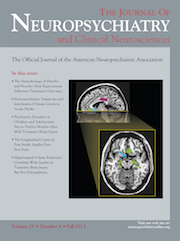To the Editor: A 58-year-old man was admitted to the Neurology department for subacute short-term memory loss and partial complex seizures. He was a retired teacher, and his past history was unremarkable. On admission, he was alert and quiet, partially disoriented in time; during observation, he often manifested temporary involvement of alertness, sometimes with involuntary movement of both arms. Neuropsychologic examination showed isolated involvement of memory function with absence of storage for verbal and spatial information.
Diagnostic procedures disclosed bilateral abnormal signal intensity on MRI in the temporomesial areas and presence of antibody against voltage-gated potassium channel.
A total body CT, a PET body scan, autoantibodies, anti-thyroid, and anti-neuronal antibodies were negative, and cerebrospinal fluid exam gave normal results.
Autoimmune limbic encephalitis was diagnosed and treatment with ev immunoglobulins was started at a dosage of 400 mg/kg/day for 5 days. Levetiracetam 500 mg bid and prednisone 50 mg/day were also prescribed.
After 1 month, his amnesic disturbances and epileptic seizures were markedly improved, but abnormal behavior was more evident, with emotional blunting and absence of motivation in his daily activity. He was oriented, and he could remember recent events of his life after he went back home, but his speech and emotional responsiveness were reduced, and his wife reported that he was indifferent and apathetic all the time. The Starkstein Apathy scale
1 was administered, and he had a very high score (40; maximum score: 45). Trandermal rotigotine was started at a dosage of 2 mg/day.
The next month, his behavior markedly improved, with an Apathy Scale score of 15. He continued to take rotigotine in the successive months, showing permanent improvement and no adverse effects.
Limbic subacute encephalitis usually is of autoimmmune origin. It was primarily considered paraneoplastic, but in recent years, it is more evidently of autoimmune origin from surface and intracellular antineuronal antibodies, with voltage-gated potassium channel (VGPC) as one of preferred neuronal attack. VGPC antibodies preferably act on surface antigens of hippocampus and amygdala neurons, and dysfunction of these regions causes anterograde amnesia and temporal seizures.
2,3Apathy is characterized by an abnormal, quantitative reduction of activities, not caused by a phisical or enviromental problem. It can be a symptom of several neurologic and medical diseases and can be differentiated from depressive symptoms. Dysfunction of amygdala, hippocampus, and frontal orbital cortex in limbic encephalitis can produce apathy with a strong emotional component, resulting in emotional blunting and reduced social drive. Indeed, in the motivation and reward circuits, the amygdala and hippocampus need to communicate to ventral tegmental area neurons whether anything relevant is being detected, and they provide contextual information about the decision to be made.
4 In our patient, apathy was an important symptom of limbic encephalitis, initially less evident because of prevailing memory involvement.
Dopaminergic neurotransmission plays an important role in regulating several aspects of basic brain function and plays a major role in the pathophysiology of attention-deficit hyperactivity disorder and schizophrenia. Degeneration of the nigrostriatal dopamine system causes Parkinson's disease (PD). Mesolimbic dopamine is crucial for motivation and reward brain systems, and dopamine blockers exert a negative effect on goal-directed behavior, with lack of motivation and apathy.
4,5Rotigotine is a dopamine agonist, with activity across D1 through D5 receptors as well as select adrenergic and serotonergic sites, that has been used in PD treatment. Continuous transdermal delivery of rotigotine maintains stable plasma levels over 24 hours with a single daily application.
6 Action of the dopamine agonist rotigotine on mesolimbic and mesocortical dopaminergic circuits could explain its beneficial effects on apathy syndrome. Further observations on rotigotine’s effects could be useful in treatment of other neurological apathy syndromes.

